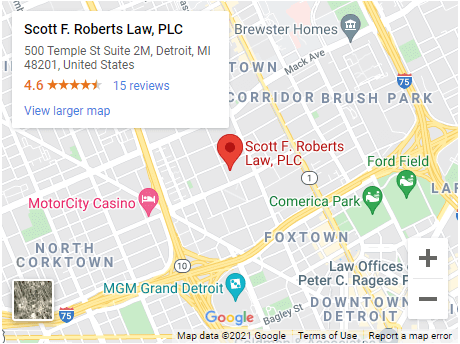With all the buzz around Medical Marijuana (MMJ), many wonder how these laws actually work in practice and who enforces them. In 2008, Michigan began passing a series of laws making it possible to sell and use marijuana for medical purposes. But once these laws passed, many questions surfaced about how these laws were going to affect Michigan residents and how they would be enforced. It is easier to understand how the laws are enforced if their function and impact on Michigan residents is understood.
What is the MMMA?
The Michigan Medical Marihuana Act (MMMA), passed in 2008 by voter referendum, established protections for medical marihuana users and caregivers. It shields them from the arrest, prosecution and penalties associated with the possession and use of marihuana. However, these protections are not without specifications.
Each qualifying registered patient can only have 2.5 ounces of usable marihuana or its usable equivalents. For qualifying patients that have properly specified a primary caregiver, that caregiver will be allowed to cultivate no more than 12 plants for that patient, and those plants must be kept in enclosed, locked facilities. As long as the patient has a valid registry identification card, does not give marihuana products to another individual, and complies with the specifications, they are immune from any criminal consequences that are typically associated with the possession of marihuana. Sales under the MMMA are mostly unregulated. There are no taxes applied, no reporting requirements, and enforcement of sales to patients not registered to the specific caregiver, while technically illegal, are rarely enforced.
Due to the unregulated, “wild-west” nature of caregiving under the MMMA, the state sought to establish a regulatory structure for the growing, processing, transporting and selling of medical marijuana. This structure, which was enacted into law as the Medical Marihuana Facilities Licensing Act, or simply the “MMFLA”, does exactly that.
What is the MMFLA?
Established in 2016, the Medical Marihuana Facilities Licensing Act (MMFLA) sets guidelines for people and entities engaged in all phases of the medical marihuana business. Similar to the MMMA, it provides additional explicit protections from prosecution if certain requirements are met. For example, people who own or lease property that has been licensed as a marihuana facility, are protected in certain requirements are met from criminal and civil penalties, sanctions, searches and prosecutions for marihuana related offences.
The MMFLA takes great care to outline the activities that are associated with the medical marihuana business. These activities include growing, transporting, purchasing, receiving, testing and altering marihuana. Unlike the MMMA, with its legal grey areas, this act draws a very clear line between legal and illegal activity, and clearly distinguishes medical marihuana business owners from simple drug dealers. It allows business owners to do what is necessary to ensure that qualifying patients have access to the products they need, without fear of criminal prosecution due to the schedule one status of marihuana. Without proper registration and licensing, patients and business owners could be subject to the criminal statutes that govern marihuana.
Law and Order
Now that we have addressed the two statutes currently on the books that allows for Marijuana use, we turn to the statutes that criminalize its sale and use. Michigan has several criminal statutes that deal with the illegal use, sale, and possession of marihuana. Marihuana is a schedule one substance and those substances normally carry jail time. The illegal possession of marihuana is a misdemeanor with a $2,000.00 fine and up to 1-year imprisonment. The illegal use of marihuana has an $100 fine and the potential for up to 90 days in jail. The serious nature of the penalties associated with this crime make it essential for patients and business owners to ensure that they remain in compliance with MMMA and MMFLA. The Department of Licensing and regulatory Affairs (LARA) plays an important role in the enforcement of MMJ laws.

What Does LARA and the Licensing Board Do?
The Department of Licensing and Regulatory Affairs (LARA) is responsible for the licensing of businesses and most skilled professions in the state of Michigan. LARA oversees the licensing and regulation of 1.2 million individuals and entities on an annual basis. To obtain a license under MMFLA, LARA facilitates a detailed two-tier qualification process which includes a pre-qualification and a licensing qualification.
In the pre-qualification phase, applicants must undergo a background check, disclose criminal violations, financial records and other information and pay a $6,000 application fee. The licensing qualification phase dives deeper into the physical location and administrative qualifications under the statute. During this time, the applicant will be subject to a pre-license investigation. An applicant with then either be approved or denied. If denied, the applicant can appeal the licensing board’s decision.
Once approved the applicant will need to undergo a second phase where the applicant’s operations are inspected and approved. Once the applicant passes this second step, they pay a regulatory assessment fee which is determined by the statute, at which time they are given a commercial medical marijuana license. It could be as low as $10,000 or as high as $57,000. In 2018, the assessments were set at $48,000.00 for most license types, the exception being the Class A 500 Plant Grow, which was only $10,000.00, and safety testing, which was $0. After the license is granted, compliance is monitored by the Bureau of Medical Marihuana Regulation (BMMR). LARA also requires annual renewals to ensure compliance.
Although LARA does assist in the vetting of companies and individuals seeking Michigan medical marijuana licenses, the ultimate decision to approve or deny an Michigan MMFLA application lies with the Licensing Board, which is made up of five political appointees. In this capacity, LARA acts as the Licensing Board’s eyes and ears, helping the board vet applicants before they come before the board.
State and Local Law Enforcement
The state police are instrumental in the enforcement of MMJ laws. Michigan uses excess revenue from medical marihuana patient and caregiver fees to boost enforcement efforts. They work closely with LARA to ensure compliance on all fronts. During the application process, the state police perform background checks on applicants. On a criminal level, their focus is to stop drug trafficking as well as illegal operations that falsely function under the umbrella of MMMA (and soon the MMFLA as well). This can mean cracking down on sales to non-patients, sales above 2.5 OZ of Marijuana, and other violations. In extreme situations, the state police will work with local police departments to execute raids on facilities that are operating criminally.
While the state police generally focuses in higher level drug charges, they will enforce criminal laws during traffic stops, including possession of Marijuana or a driving offense similar to a DUI. In other words, if you are caught speeding, and state police notice the smell of Marijuana from your car and you do not have a patient card, your vehicle could be searched and you could be charged with a marijuana criminal offense.
In addition to state laws, municipalities also have their own laws prohibiting or restricting Marijuana that are enforced by the local police. These laws vary widely from city to city in terms of strictness as well as enforcement. On the one hand, some cities have completely decriminalized marijuana. Other cities, especially those in more rural areas, will still lock up any non-medical user found in possession of cannabis. In Ann Arbor, Michigan, for example, the fines for non-medical usage are capped at $100 with no jail time, and the penalty for first time usage is a civil infraction which is a $25 fine. The city of Detroit has also taken steps to decriminalize marihuana usage.
What the future holds
In November, Michigan voters will decide whether marihuana will be legalized for recreational purposes. Recreational legalization will be a significant change, but it will not be the free for all some envision it to be. There will still be restrictions and laws making certain sales and possession about a certain amount illegal.
The ballot initiative will limit usage to people over the age of 21. In addition to the age regulation, limitations on individual cultivation and a 10% excise tax will be placed on marihuana products (the MMFLA only provides for a 3% excise tax). Revenue from this tax will be redirected into education and maintaining the state’s roads.
If this legislation passes, several considerations will need to be made concerning those who are imprisoned for those marihuana related offenses. The legalization of marihuana for recreational usage would create two markets. This creates a need for a new department separate from the Bureau of Medical Marihuana Regulation to regulate recreational usage. Alternatively, the state legislature could pass new legislation to meld the two regulatory schemes together, as we suggested in this article.
Although marihuana would be legal in Michigan, it would still be considered illegal federally. There are currently certain protections contained in the Rohrabacher-Blumenauer amendment that protection state-compliant medical marijuana programs and businesses. However, these protections currently only apply to state medical marijuana programs and the individuals that work in the medical marijuana market. They would not apply to Michigan’s recreational cannabis ballot proposal.
Understanding how MMJ laws are enforced is crucial for people currently in the medical marihuana industry, and people who may be looking to get involved in the near future. Because this is only a brief overview of MMJ laws and the roles of those who enforce these laws, we recommend that you consult with an MMJ attorney to answer questions concerning compliance and to ensure that all areas of your business are operating flawlessly and legally under the MMFLA.




